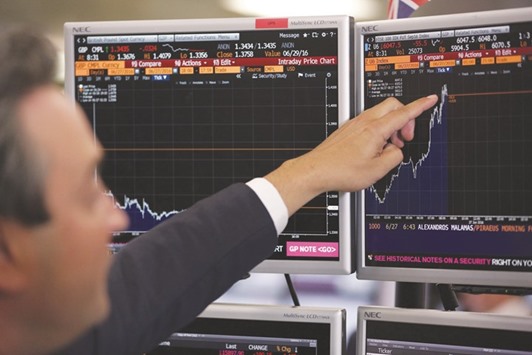Britain battled to stop worldwide Brexit alarm yesterday but failed to prevent the pound crumbling to a three-decade low against the dollar as European shares took a fresh plunge.
Asian markets had steadied a little after Britain’s June 23 vote to abandon the European Union wiped $2.1tn off international equity values on Friday.
But investors started a new wave of selling in European trade as they grappled with the financial consequences of the Brexit referendum.
“Today I want to reassure the British people, and the global community, that Britain is ready to confront what the future holds for us from a position of strength,” Britain’s finance minister, George Osborne, declared before European financial markets opened.
Britain’s economy is “as strong as could be”, the minister said.
Hours later, the pound had skidded to $1.3194 in London trade, its lowest level against the dollar since September 1985.
The FTSE 100 ended 2.6% lower at 5,982.20 points, taking total losses to 5.6% in two sessions and wiping off nearly £100bn ($132bn) since the referendum results early on Friday. Shares in easyJet recorded their biggest one-day percentage drop in 12 years.
“George Osborne’s comments have clearly prevented a much more dramatic decline yesterday morning, but markets will remain incredibly volatile throughout the long-winded process of exiting the EU,” said Interactive Investor equity strategist Lee Wild in London.
British budget airline EasyJet, which warned of a Brexit hit to sales, plunged by nearly 19%. International Airlines Group, parent of British Airways and Iberia, dropped nearly 10%. Royal Bank of Scotland shares slumped 18%. Lloyds Banking Group fell 10%. British construction group Taylor Wimpey tumbled nearly 16%.
One fifth of British business leaders are considering moving operations abroad after the referendum, according to a survey from leading business lobby group, the Institute of Directors.
“Any sense of calm is very fragile and the situation could change rapidly,” said Joe Rundle, head of trading at ETX Capital.
In eurozone equity trading, Frankfurt’s DAX 30 index slumped 2% as the country’s biggest lender Deutsche Bank slid nearly 9%.
The CAC 40 in Paris shed 1.8%. In Madrid, shares fell 1.5%, frittering away early gains after the ruling conservative Popular Party emerged on top in elections Sunday and vowed to try to form a government.
Stephen Innes, senior trader at OANDA Asia Pacific, warned sterling “is extremely vulnerable” and predicted an interest rate cut in the summer.
He also said there was “a huge concern that London’s status as the global financial capital will crumble” if it loses its “passporting” rights, which permit banks to locate themselves in Britain while offering products and services in the wider EU.

A trader from ETX Capital points to a Bloomberg terminal showing the FTSE 100 index in London. The index fell 2.6% to 5,982.20 points, taking total losses to 5.6% in two sessions and wiping off nearly u00a3100bn ($132bn) since the referendum results early on Friday.


